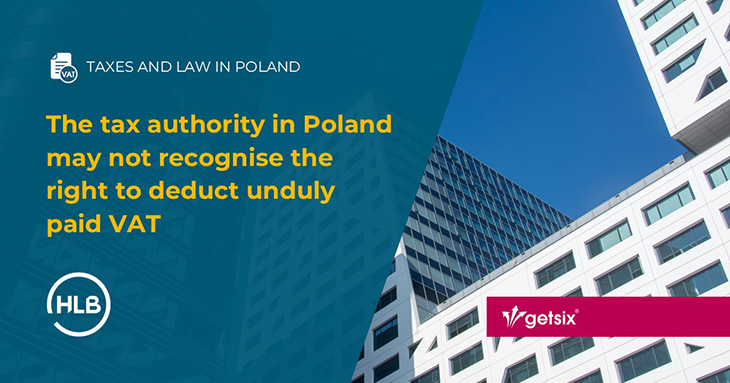The tax authority in Poland may not recognise the right to deduct unduly paid VAT
The judgment of the Supreme Administrative Court of Poland (NSA) of 29 October 2024 (case no. I FSK 352/21) introduces important guidelines regarding the right to deduct VAT in cases where transactions should have been subject to the reverse charge procedure. This judgment emphasises that businesses may lose the right to deduct VAT even if they acted in good faith and the invoice was issued erroneously by the service provider.
Judgment of the Supreme Administrative Court – key theses
The Supreme Administrative Court held that tax authorities in Poland are not obligated to verify whether a service provider can correct an erroneously issued invoice. This implies the following:
- The right to deduct VAT may be denied even if there are no suspicions of tax fraud.
- If the transaction should have been accounted for under reverse charge rules and the taxpayer has deducted the VAT resulting from the erroneous invoice, the tax authority may challenge such a deduction.
- Taxpayers should be able to claim a refund directly from the tax authority in situations where the recovery of VAT from the supplier is unduly difficult (e.g. due to the supplier’s insolvency).
Context of the judgment
The judgment of the Supreme Administrative Court also refers to an earlier judgment of the Court of Justice of the European Union (CJEU) of 11 April 2019 in case C-691/17. The CJEU emphasised that while tax authorities, including those in Poland, have the right to refuse to deduct VAT, they must ensure alternative mechanisms for taxpayers to recover the tax. This is particularly relevant when the service provider:
- incorrectly charged VAT,
- paid it to the state budget in Poland, and
- his insolvency makes it impossible to reimburse the taxpayer.
Neutrality and proportionality principles
The judgment of the Supreme Administrative Court takes into account the principles of neutrality and proportionality of VAT arising from EU regulations. This means that a taxpayer who has borne the economic burden of the tax should not be taxed twice. However, to invoke these protections, taxpayers in Poland must demonstrate due diligence, particularly in verifying their business partners and the correctness of invoices received.
Implications for businesses in Poland
The Supreme Administrative Court’s decision poses new challenges for businesses in Poland in terms of tax settlements.
To minimise the risk of being denied the right to deduct VAT, it is necessary to:
- Verify invoices accurately – ensuring that transactions are accounted for in accordance with the correct accounting mechanism.
- Safeguard documentation – keeping records to confirm the correctness of settlements and exercising due diligence to the Polish tax authorities.
- Plan financial security in case of disputes – budget for potential tax adjustments and disputes that may arise under Polish tax regulations.
Tax procedures in Poland as a key risk mitigation tool
Conducting business in Poland carries the risk of inadvertent involvement in so-called VAT carousel fraud. This can result in the denial of the right to deduct VAT or accusations of failure to exercise due diligence.
The Supreme Administrative Court judgment highlights the importance of implementing robust contractors’ verification and documentation control procedures, particularly within the framework of Polish tax law. Businesses operating in Poland should regularly update their procedures to reflect changing regulations and recent case law. Preparing for tax audits, which are increasingly focusing on VAT compliance, is also essential.
Well-structured procedures allow businesses in Poland to:
- identify problematic invoices at an early stage,
- minimise the risk of accounting errors, and
- protect the company from adverse consequences arising from counterparties’ actions.
Conducting a tax audit is the first step toward establishing effective tax compliance procedures. This allows the company to avoid costly mistakes and ensure compliance with current legislation.
Professional support in reducing tax risk in Poland
To effectively mitigate tax risks, it is crucial to develop and implement appropriate tax procedures tailored to the Polish tax system. These not only support correct fulfilment of tax obligations, but also help demonstrate due diligence to tax authorities in Poland.
We offer comprehensive tax audits, which allow to identify potential risks and adapt company’s activities to current regulations in Poland. Our services also include legal advice, which supports businesses in preparing for the ever-increasing number of tax inspections, particularly in the field of VAT taxation.
Ensure your company’s tax security – contact us and see how we can help.
Conclusion
The Supreme Administrative Court’s judgment is a reminder of the need for extreme diligence in VAT settlements in Poland. The denial of the right to deduct unduly paid VAT, even in the absence of fraud suspicions, can result in severe financial consequences. This is why it is so important for businesses to take care of their tax procedures and to keep up to date with current legislation and case law.
Due diligence not only protects businesses from sanctions, but also allows them to effectively assert their rights in contentious situations under Polish law.
If you have any questions regarding this topic or if you are in need for any additional information – please do not hesitate to contact us:
CUSTOMER RELATIONSHIPS DEPARTMENT

ELŻBIETA
NARON-GROCHALSKA
Head of Customer Relationships
Department / Senior Manager
getsix® Group
***














